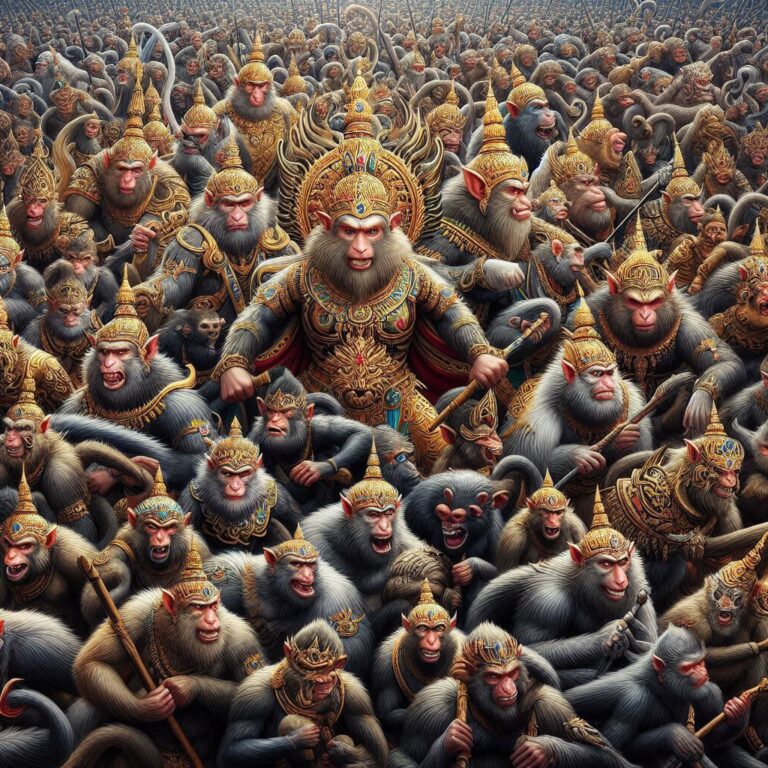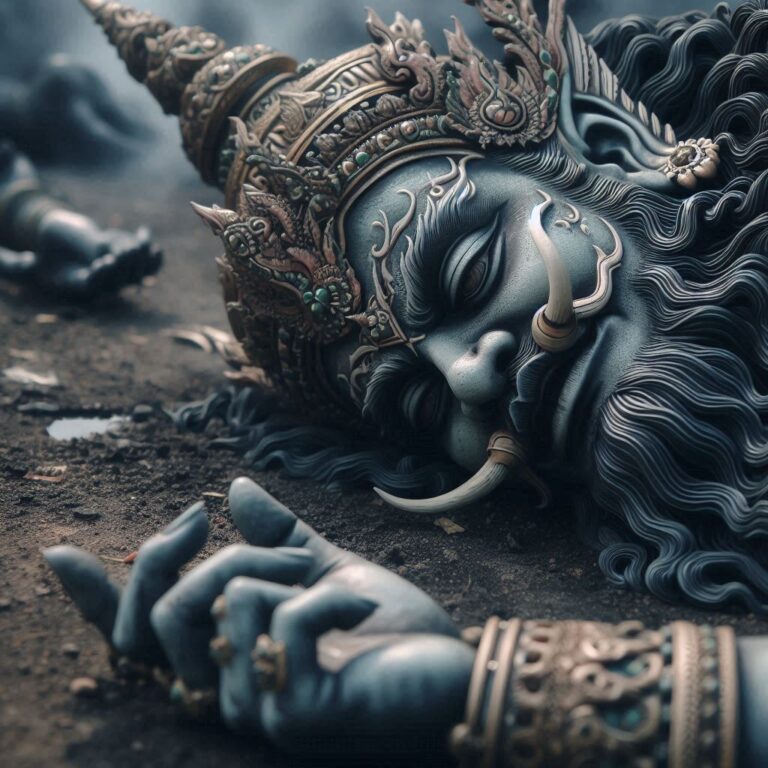Dasharatha’s Rule and Prosperity: The Glory of King Dasharatha’s Reign
King Dasharatha, the father of Lord Ram, is a central figure in the epic of the Ramayan. His reign over Ayodhya is often hailed as a period of immense prosperity, justice, and righteousness. This article delves into the various aspects of Dasharatha’s rule, highlighting his contributions to the kingdom and the lasting legacy he left behind.
King Dasharatha: A Legacy of Valor
Dasharatha belonged to the illustrious Ikshvaku dynasty, a lineage known for its adherence to Dharma and valor. His early life was marked by rigorous training in statecraft and warfare, preparing him to take on the mantle of kingship. Upon ascending the throne, Dasharatha quickly established himself as a ruler of great wisdom and strength, respected by his subjects and feared by his enemies.

The Ideal Ruler
Dasharatha was the epitome of an ideal ruler. His reign was characterized by a deep commitment to Dharma, ensuring that his decisions were always just and fair. His subjects revered him, and neighboring kingdoms sought his counsel, a testament to his wisdom and leadership.
The Prosperity of Ayodhya
Under Dasharatha’s rule, Ayodhya flourished like never before. The kingdom saw unprecedented economic growth, with agriculture, trade, and culture thriving in harmony. The city of Ayodhya was described as being wealthy and abundant, with no scarcity or poverty in sight.
श्लोक:
अयोध्याया नमस्तुभ्यं सर्वधर्माधिके स्थले।
धनधान्यसमायुक्ते रामेन सुलभीकृते॥
Ayodhyāyā namastubhyaṁ sarvadharmādhike sthale |
Dhanadhānyasamāyukte rāmena sulabhīkṛte ||
Translation: “Salutations to Ayodhya, the supreme abode of Dharma, filled with wealth and grains, made prosperous by Lord Ram.”
This shloka beautifully encapsulates the prosperity and abundance that Ayodhya enjoyed under Dasharatha’s rule.
Dasharatha’s Just Governance
Dasharatha was known for his fair and just governance. His legal and judicial practices were ahead of their time, ensuring that every subject, regardless of status, received justice. Welfare programs were implemented to ensure that even the most marginalized sections of society were taken care of.
Military Prowess
A skilled warrior, Dasharatha led his armies to numerous victories, securing the borders of Ayodhya and expanding its influence. His military prowess was unmatched, and his ability to maintain peace through strength was a key factor in the kingdom’s prosperity.
Relations with Neighboring Kingdoms
Dasharatha was not only a warrior but also a diplomat. He forged alliances and treaties with neighboring kingdoms, ensuring peace and stability in the region. His diplomatic acumen further solidified his reputation as a wise and effective ruler.

Cultural Flourishing Under Dasharatha
Dasharatha was a great patron of the arts. Under his reign, Ayodhya became a hub of cultural activities, with music, literature, and art flourishing. Scholars and sages from across the land were invited to the court, contributing to a rich intellectual environment.
Spirituality and Dharma
Dasharatha was deeply spiritual, with a strong devotion to the gods. He regularly performed yajnas and other religious rituals to ensure the well-being of his kingdom. His adherence to Dharma was evident in every aspect of his rule, from governance to personal life.
दोहा:
राजा दशरथ भक्तीधारी, धरम कीनो सदा संवारी।
यज्ञ कराए बहुत विधि, सुख सृजन भयो सब विधि।
Rāja Daśarath bhakti dhārī, dharam kīno sadā sanvārī |
Yajña karāe bahut vidhi, sukh sṛjan bhayo sabh vidhi ||
Translation: “King Dasharatha, a beacon of devotion, always upheld Dharma. He performed many yajnas, bringing happiness and prosperity to all.”
This doha highlights the deep spiritual foundation of Dasharatha’s reign, which contributed to the kingdom’s prosperity.
Dasharatha’s Family Life
Dasharatha’s family life was marked by love and respect. His queens, Kaushalya, Kaikeyi, and Sumitra, were revered figures, and his sons, particularly Ram, were the pride of Ayodhya. The close-knit royal family set a powerful example for the kingdom.
Challenges During Dasharatha’s Reign
Despite his successes, Dasharatha’s reign was not without challenges. He faced internal strife and external threats, but his leadership and commitment to Dharma allowed him to overcome these obstacles. His decisions, though sometimes difficult, were always aimed at the greater good.
Dasharatha’s Decision to Perform the Putrakameshti Yajna
As Dasharatha grew older, the need for an heir became a pressing concern. His decision to perform the Putrakameshti Yajna was a pivotal moment in the Ramayan. This yajna, conducted with great devotion, led to the birth of his sons, Ram, Bharat, Lakshman, and Shatrughna.
श्लोक:
पुत्रकामेष्टिमाहेन्द्रं यज्ञं क्रियाययुर्जनाः।
सर्वदेवाः समागम्य तत्संस्थायज्ञमाचरन्॥
Putrakāmeṣṭimāhendraṁ yajñaṁ kriyāyayurjanāḥ |
Sarvadevāḥ samāgamya tat-saṁsthāya-yajñamācharan ||
Translation: “For the desire of a son, the people initiated the great Putrakameshti Yajna, and all the gods assembled to participate in this sacred ritual.”
This shloka underscores the importance of the yajna in ensuring the continuation of Dasharatha’s lineage.
The Legacy of Dasharatha’s Reign
Dasharatha’s reign left an indelible mark on Ayodhya and its people. His commitment to Dharma, his just governance, and his contributions to the cultural and spiritual life of the kingdom are remembered and revered to this day. The Ramayan itself serves as a testament to his legacy, with his life and decisions shaping the course of the epic narrative. His reign laid the foundation for the story of Lord Ram, and his decisions, such as the exile of Ram, continue to be pivotal moments in the Ramayan.
The End of Dasharatha’s Rule
Dasharatha’s rule came to an emotional end when he made the heart-wrenching decision to send Ram into exile, fulfilling a promise he had made to his queen, Kaikeyi. This decision, though made out of a sense of duty and honor, deeply affected him. The separation from Ram proved to be too much for the aging king, and he passed away in grief, leaving the throne of Ayodhya in the hands of his sons.
Conclusion
King Dasharatha’s rule was a golden age in the history of Ayodhya. His leadership, commitment to Dharma, and just governance made his reign a time of unparalleled prosperity and peace. Despite the challenges he faced, both external and internal, Dasharatha remained steadfast in his principles, ensuring that his kingdom thrived under his rule. His legacy lives on not just in the Ramayan but in the hearts of those who revere the ideals of righteousness, devotion, and duty.
FAQs
1. What made King Dasharatha an ideal ruler?
- King Dasharatha was known for his adherence to Dharma, his just and fair governance, and his military prowess. His commitment to the well-being of his people and his kingdom made him an ideal ruler in the eyes of his subjects and peers.
2. How did Dasharatha contribute to the prosperity of Ayodhya?
- Dasharatha’s reign saw the flourishing of trade, agriculture, and culture. He maintained strong diplomatic and military relations, ensuring peace and prosperity in Ayodhya. His patronage of the arts and his spiritual devotion also contributed to the kingdom’s overall growth.
3. What were the key challenges faced by Dasharatha during his reign?
- Dasharatha faced both internal strife and external threats. He had to manage diplomatic relations with neighboring kingdoms, defend his kingdom from invasions, and deal with personal challenges within his family. His decision to exile Ram, in particular, was a major emotional and political challenge.
4. Why was the Putrakameshti Yajna significant in Dasharatha’s life?
- The Putrakameshti Yajna was significant because it led to the birth of his sons, particularly Ram, who would later become the hero of the Ramayan. This yajna ensured the continuation of Dasharatha’s lineage and played a crucial role in shaping the events of the epic.
5. How is Dasharatha’s legacy remembered in the Ramayan?
- Dasharatha’s legacy is remembered as one of righteousness, devotion, and duty. His reign is considered a golden period in Ayodhya’s history, and his decisions, particularly his sacrifice in sending Ram into exile, are seen as acts of honor and duty that set the stage for the greater narrative of the Ramayan.







One Comment